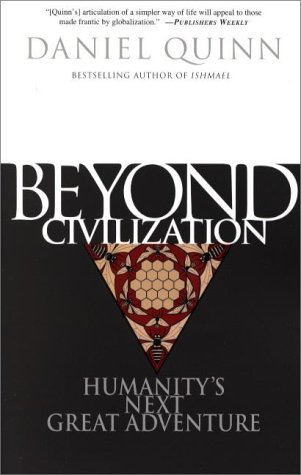Beyond Civilization: Humanity’s Next Great Adventure
In Beyond Civilization, Daniel Quinn thinks the unthinkable. We all know there’s no one right way to build a bicycle, no one right way to design an automobile, no one right way to make a pair of shoes, but we’re convinced that there must be only one right way to live — and the one
In Beyond Civilization, Daniel Quinn thinks the unthinkable. We all know there’s no one right way to build a bicycle, no one right way to design an automobile, no one right way to make a pair of shoes, but we’re convinced that there must be only one right way to live — and the one we have is it, no matter what.
Beyond Civilization makes practical sense of the vision of Daniel Quinn’s best-selling novel Ishmael. Examining ancient civilizations such as the Maya and the Olmec, as well as modern-day microcosms of alternative living like circus societies, Quinn guides us on a quest for a new model for society, one that is forward-thinking and encourages diversity instead of suppressing it. Beyond Civilization is not about a “New World Order” but a “New Personal World Order” that would allow people to assert control over their own destiny and grant them the freedom to create their own way of life right now — not in some distant utopian future.Futurist Daniel Quinn (Ishmael) dares to imagine a new approach to saving the world that involves deconstructing civilization. Quinn asks the radical yet fundamental questions about humanity such as, Why does civilization grow food, lock it up, and then make people earn money to buy it back? Why not progress “beyond civilization” and abandon the hierarchical lifestyles that cause many of our social problems? He challenges the “old mind” thinking that believes problems should be fixed with social programs. “Old minds think: How do we stop these bad things from happening?” Quinn writes. “New minds think: How do we make things the way we want them to be?”
Whether he is discussing Amish farming, homelessness, “tribal business,” or holy work, Quinn’s manifesto is highly digestible. Instead of writing dense, weighty chapters filled with self-important prose, he’s assembled a series of brief one-page essays. His language is down to earth, his metaphors easy to grasp. As a result, readers can read about and ponder Beyond Civilization at a blissfully civilized pace. –Gail Hudson







Comments